#riptoned
Text
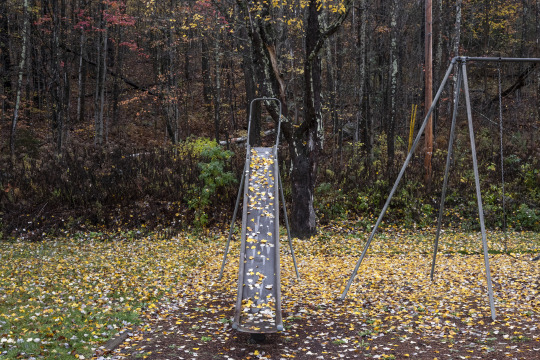
Ripton, Vermont
October, 2023
#photographers on tumblr#lensblr#original photographers#imiging#luxlit#street photography#photography#Ripton#Vermont
20 notes
·
View notes
Text

Happiness for all beings, Ripton, VT, 2023
GIF: Bruce Morrow
#bruce morrow#brucemorrow#bruce-morrow#animated gif#animated gifs#digital art#nft digital art#the moment that#my art#myart#the moment that we are today#art#music#my gifs#dance#lgbtq#themomentthat#Ripton Vermont#Vermont#green mountains#green#trees#happiness for all beings#gifs#gifs on tumblr
10 notes
·
View notes
Text
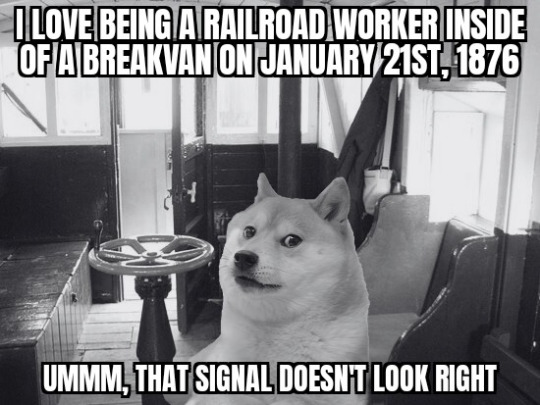
8 notes
·
View notes
Text
Eek-a-mouse aka Ripton Joseph Hylton.
🇯🇲 🇯🇲 🇯🇲


#🇯🇲#Rasta#rastastyle#rastafari#Jah#Eek a mouse#Eekamouse#reggae#reggaton#reggae music#Reggae musician#Ripton Joseph Hylton#mini mouse#Minie mouse#Dub#Ska#jamaican music#jamaica
10 notes
·
View notes
Photo

(via 17 Peaceful Towns In Vermont That Offer Nothing But Peace And Quiet)
0 notes
Text
The Destruction of Engine Culture:
Ok, so this is going to be another long, and rambling post. So be warned. And as usual, this is a RWS theory post, so there will be talk of scrap.
That said, let's dive into the destruction of engine culture.
So, I think the first thing to ask is what would be 'engine culture' and how would it affect the railways of Britian (and globally) - and the answer is quite simple: it's the same as human culture. Humans have developed cultures for millennia, and they are often quite similar, and this is hypothesized to be because these cultures had similar things to warn about. Warning about the dangers of flooding, of wild animals, of droughts and fires. Many of the oldest stories are tales told to teach practical lessons. Little Red Riding Hood is as much about stranger danger and the threat wild animals pose as it is a story about a crossdressing wolf. Some scientists believe games like tag and catch were developed by our hunter-gatherer ancestors to teach hand-eye coordination and improve stamina. This is of course very early culture: stories, games and songs passed down from one generation to the next - but that's what we're talking about here. Railways are 220 years old at the oldest possible (and there are surviving engines from this era), so it's an early era of culture for them.
Furthermore, engines would inherit much of their railways' culture, depending on where they are. An engine working in Tsarist Russia would grow up with that culture, whereas an engine in Argentina, or France, or Kenya would grow up with the local cultures. This includes language, music, belief systems and otherwise. So that's the basis of engine culture itself: human culture. Engines learn human language, they sing human songs and they might even take on human beliefs.

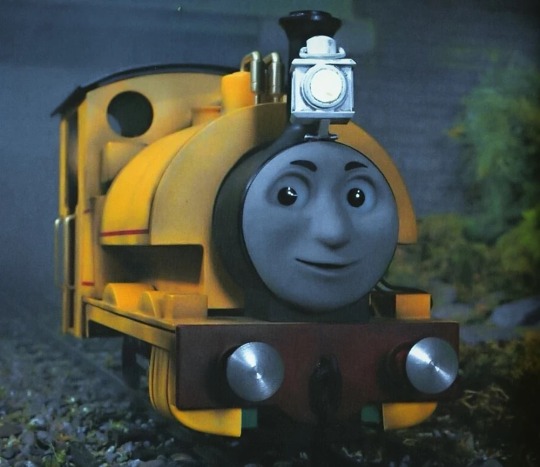
They do, however, have their own beliefs. Lady, for one, with her gold dust and magic, has been used by fanfic authors as an 'engine deity', while Thomas and Friends alluded to Proteus being a deity of some sort, with a magic lamp. These engine 'deities' exist, it seems, as a focal point for engines. Proteus represents the ability to make wishes - something engines really don't have, while Lady represents freedom. She's able to travel great distances on her own, between continents, without needing to pull trains. Does that not sound like the railway version of attaining freedom?
So the engines have 'deities'. I won't call them gods, because that's very likely not what they are, but they are legends told by older engines to younger ones.
The other kind of legends that would really dominate engine culture would be practical moral tales - in the same vein as Little Red Riding Hood being about stranger danger and the threat of wild animals, stories told between engines would be warnings about the trucks, or bad stretches of line, or dangerous weather. But unlike fairy tales, these stories would come from experience. Engine culture is very new, and it's being developed continuously during the Victorian era. Incidents like the Tay Bridge Disaster, or William Huskisson's death, or the Abbots Ripton rail disaster all are quickly turned into stories told by the older engines to teach the new arrivals (of which there are hundreds by the year) about how to run the railway as safely as possible.


The engines also develop games which help them to watch signals, or counter miles, or figure out their location in adverse conditions. These games started as training exercises, but became more fun as young engines made them competitions. They also develop songs of their own, which can tell messages:
"Once an engine when fixed to a train
Was alarmed at a few drops of rain,
So went "puff" from its funnel
Then fled to a tunnel,
And would not come out again."
The message: don't stop in a tunnel.
But the thing is, this post is about the destruction of engine culture, and now that I've explained it, I'm going to explore how it was decimated.
And for that, we start with the Second World War, which saw a complete upheaval of the railways of Britain. The war was especially hard on the railways, and engines were often used around the clock with no rest. This meant that a lot of the newer engines never got to hear these stories before being sent out for weeks at a time, as they never spent any time at a single shed. And even if they were parked up at a shed, everyone was so exhausted they didn't have time to tell tales. And at the end of the war, a lot of the oldest engines were withdrawn, completely worn out. The oldest engines were the ones who told many of the tales, and their loss was the start of a decline.
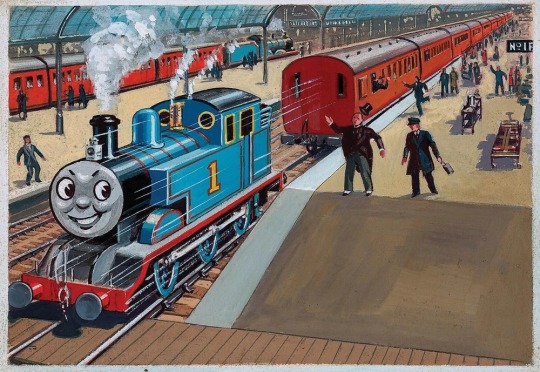

The Railway Series, however, would pick up a lot of the slack from this loss, as many of its earliest stories were in that same moral vein as traditional 'engine culture' stories, focusing on listening to elders, not stopping in tunnels, being patient, gentle with coaches, careful with trucks - it's all there. And I can see that being due to Edward teaching the Reverend many of these stories, in a bid to keep them from vanishing. And he would continue on, joined by other older engines like Skarloey, Rheneas and Toby, as the book series went on. Things like listening to advice and not acting recklessly pop up constantly - especially with Duncan, who Skarloey had to deal with.
It all gets worse when British Railways forms though. And this is where the 'railway rulebook', the attitudes of diesels and the doctrine of BR all come in to play. As the doctrine and official rulebook of British Railways portrays steam engines as inferior, weaker engines, the diesels are indoctrinated into believing it - and thus, they refuse to listen. Take Diesel for example, who believes that diesels can just arrive at a yard and 'improve it'. He is immediately foiled by some jammed breaks - something he may have learnt about from a story or a tale from a steam engine. But he never stopped to listen. And it's the same across the country, across the world in fact. As the successful diesel classes prove themselves to their managers, they are rolled out and steam engines are withdrawn - and with that, so is the culture they were the keepers of.

But this isn't quite the end of this 'engine culture' yet, because one group willing to listen to the steam engines are the 'failures'. Engines like BoCo and Derek would be very willing to listen to the engines that have tales that may just help them. Stories like how to best use sand in a storm, or how to conserve energy over the Settle-Carlisle route. And so even as steam dies, these 'failures' hold their culture, and try their best to preserve it, alongside the preserved engines. The Railway Series does too, such as in 'Stepney the Bluebell Engine', where sanding is explicitly mentioned. Another group that take in this engine culture is the GWR diesel-hydraulics, who grew up with GWR ideology, and thus would have been more willing to listen to their steam ancestors.
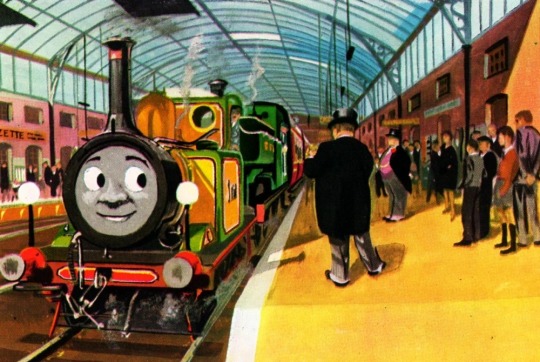
But these 'non-standard' engines were also quickly wiped out. And this leaves only a few pockets of engines who remember the old stories: the preserved engines, and the few Gen-1 diesels who did listen. By the end of the working lives of the Class 40s, the Deltics and the 'Peaks', they are the last engines who remember the old stories from the steam era working on British Railways, and when they are scrapped, the next generation grows up relearning everything.
Because the fact is that these stories held a major purpose, and the destruction of that culture means that every mistake every warned against is suddenly being made again, and again, and again. We notice this in the Railway Series, where Diesel, and Class 40, and D199 and even Bear all make very elementary mistakes that would have been warned against in these cultural stories - like taking care around trucks or looking out for the wind. And it only gets worse as this first generation are scrapped. Engines scramble to a standstill on leaves again, engines get trapped in floods, or lost in storms, or run through signals - and it's because the games, the songs, the stories, everything that would have prevented these accidents is lost.
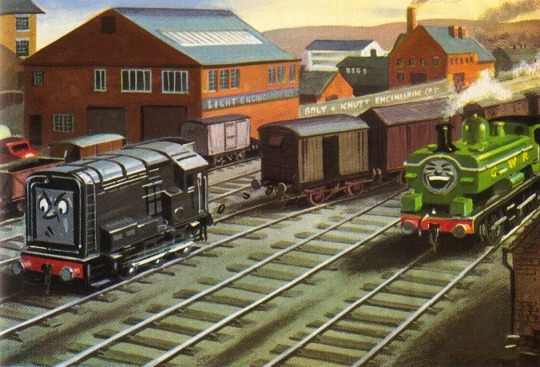
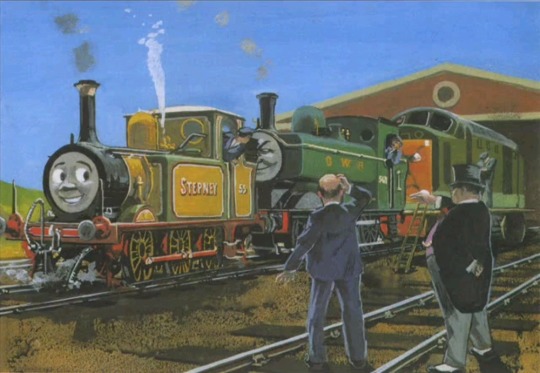
It's not until these diesels reach preservation that they hear the stories remembered by the steam engines, and that's when they realise that... hey, maybe the ancestors were right after all.
The saddest part is that it's not only a global thing, but that it's still very much a problem on modern railways. The loss of 'engine culture' between the 1950s and the 1980s would have a domino effect that would still impact modern railways, as the even newer electric engines and multiple units face the same issues but with no prior knowledge.
The pictures in this post are not mine.
#fanfiction writer#thomas the tank engine#weirdowithaquill#railways#railway series#the railway series#ao3 stuff#very long post#long reads#british rail#british railways#engine culture#ttte lady#ttte proteus#ttte diesel#ttte class 40#ttte stepney#ttte analysis
109 notes
·
View notes
Photo

Hey!
Did you know that I wrote a book? Because I did! It’s called “A Final Girl’s Survival Guide”!
Check it out!
A group of friends. A road trip. A sleepy mountain town. Tale as old as time, right?
Not like this.
All Ariadne wanted was to reconnect with the people she used to love more than anyone. Rekindle bonds from her childhood.
Make memories that she could look back on fondly in her golden years.
But someone else in the town of Ripton Mills had a different plan for her summer vacation, and what was once a simple weekend trip with friends in a remote cabin quickly became a harrowing nightmare.
She'll have to rely on all her horror instincts to get out of this mess alive.
Can she use this knowledge to save her friends as well?
It’s got spooky woods, crude humor, and a sexy, sexy slasher! If that sounds like your jam, it is available on Kindle and print on demand right now!
>>> HERE! <<<
#stuff for lookin at#a final girl's survival guide#book release#horror#comedy#fiction#slasher#romance#my scribblins
311 notes
·
View notes
Audio
The eternally irrepressible Ripton Hylton, 1991 vintage
43 notes
·
View notes
Note
I meant service to Ripton, MA.
Ah sorry, yeah easy mistake to make on account of the telecommunications interference. Eagles you know
3 notes
·
View notes
Text
evil minnie ripton
hating you is easy because you're ugly
4 notes
·
View notes
Text
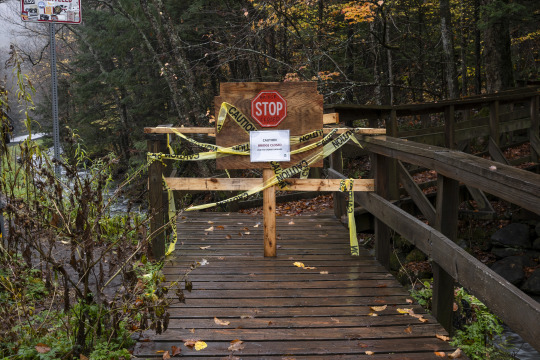
Ripton, Vermont
October, 2023
11 notes
·
View notes
Text

A river runs through it, Ripton, VT, 2023
GIF: Bruce Morrow
#the moment that#the moment that we are today#beyonce#bruce morrow#hashtag#hashtagupmyass#art#animated gif#lgbtq#museum#brucemorrow#bruce-morrow#digital art#animated gifs#nft digital art#my art#myart#my gifs#gifs#gifs on tumblr#themomentthat#green mountains#green mountain national forest#ripton vt#vermont#Ripton
6 notes
·
View notes
Photo
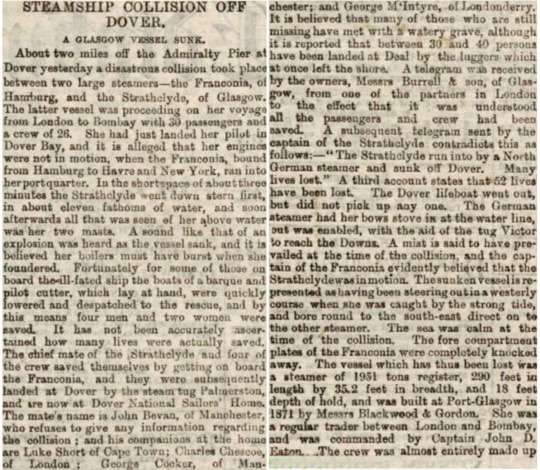
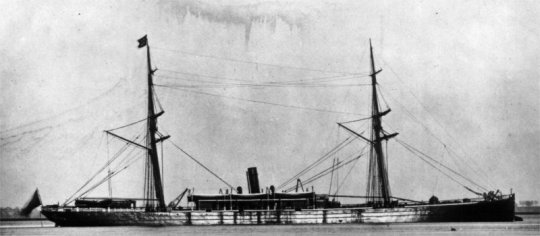

On Thursday, February 17th 1876 SS Strathclyde, built by Blackwood & Gordon, Glasgow and owned by the Burrell shipping group collided with a German ship near Dover.
The Strathclyde left Dover on Thursday, February 17th 1876 and was about two and a half miles from Dover proceeding at nine knots in clear weather. She was overtaken by the German steamship Franconia around 4 to 5pm. Capt Eaton turned his ship to starboard but at the same time the Franconia turned to port and a collision occurred.
The German vessel struck the Strathclyde between her funnel and mainmast, cutting into her to a depth of four feet. The colliding vessel went astern only to rebound and strike a second time making another deep hole abreast of the mainmast The Strathclyde sunk rapidly by the stern. The first lifeboat was lowered with 15 women on board but was swamped by the swell and capsized drowning most of its occupants. A second lifeboat was launched without mishap and managed to save 2 of the drowning people. By this time, the seas were breaking over the vessel as high as the bridge and washing overboard many of those on deck. The captain, 2nd Engineer and a fireman, the last to leave, jumped overboard as she sank Of those on board, 38 were drowned, Capt Eaton was among the survivors.
The subsequent trial, held at the Central Criminal Court in London, of the German master of the Franconia, found the master guilty of manslaughter. On appeal, however, it was discovered that English Law didn’t cover him in English waters, and they had to let him go. This led directly to the adoption by Parliament of the existing International Territorial Waters law, which many other countries already used.
A Leading newspaper of the day reported the story as follows:
THE COLLISION OFF DOVER“
As each fresh disaster is reported, it seems to eclipse its predecessors in strangeness and unaccountability. People wondered naturally enough why the Deutschland should have blundered on to the Kentish Knock, when, she had she kept her right course, she would have been miles away, but there was at least the excuse of dense fog and a powerful current; not so with the calamity of last week. The Franconia, in broad and clear daylight, bore down upon the Strathclyde as though maliciously chasing her for the purpose of running her down, and though the captain of the hapless vessel twice altered her course to get her out of the pursuer’s way, on she came till the fatal crash as heard, and in a few minutes the ship had sunk.
The chief mate and four seamen of the Strathclyde jumped for their lives, and scrambled on board the Franconia, where they allege there seemed to be no order or discipline. Seizing hatchets and knives, they tried to cut away the boats in order to help those they had left behind, but the Franconia steamed on without even throwing a rope, the captain declining to turn back when appealed to. Meantime two of the Strathclyde’s boats were successfully loosed, and each swamped by the rush of water caused by the settling down of the ship.
Twenty-nine of the crew and six of the passengers were picked up by small craft which happened to be at hand, but several of these have since died, and about forty other persons were drowned. Amongst the victims was Mrs. Green, a niece of Mr. Dion Boucicault, whose recent family bereavement by the railway accident at Abbot’s Ripton will be fresh in the memory of our readers. No evidence was offered at the inquest in explanation of the conduct of the Franconia in rushing so wildly on to another vessel, or by neglecting to stand by after the accident occurred.
The Franconia is now detained at London, and the Board of Trade inquiry will, doubtless, elicit some statement from those on board. Meanwhile, it is difficult to imagine what excuse can possibly be urged in extenuation of such apparent inhumanity. Captain Eaton, of the Strathclyde, who stayed by his vessel till the last moment, and who is now lying dangerously ill at Deal, speaks highly of the conduct of all on board, but as she went down in ten minutes, there was not time to launch the boats in safety.
There were twenty-four life-belts and eight life-buoys on board. Several of these were used by the ladies, and in some cases they were the means of saving life. Some of the witnesses at the inquest say that had other boats put out from Dover, more lives might have been saved, and the tug Palmerston is blamed for going to the aid of the Franconia instead of the Strathclyde. It is to be hoped, however, that these instances of apparent inhumanity have been unconsciously exaggerated, or are capable of explanation.”
8 notes
·
View notes
Text
Describing my favorite lesser known Stephen King characters in only a few words
Under the Dome:
Junior Rennie: gay misogynist with a brain tumor
Dale "Barbie" Barbara: world's unluckiest linecook
Andy Sanders: I am interested in becoming a meth head
The Regulators
Seth Garin: possessed autism baby
Cary Ripton: dead as hell
John Marinville: obligatory self insert writer protagonist
The Long Walk
Ray Garraty: guy who lets anyone have a chance at being his friend
Peter McVries: awesomely fit emo poet
Arthur Baker: country boy I love you
Stebbins: angel, bunny, weirdo with deep deep daddy issues
Rage:
Charlie Decker: touching grass is not enough I need to fight my dad
Joe McKennedy: jerk jock trope subverted
Ted Jones: I'll keep all my feelings right here and then one day I'll die
The Institute
Luke Ellis: your average all American telekinetic child
Nicky Wilholm: emo rebel; Luke Ellis' bisexual awakening
Kalisha Benson: bandaging your wounds while she calls you an idiot
38 notes
·
View notes

